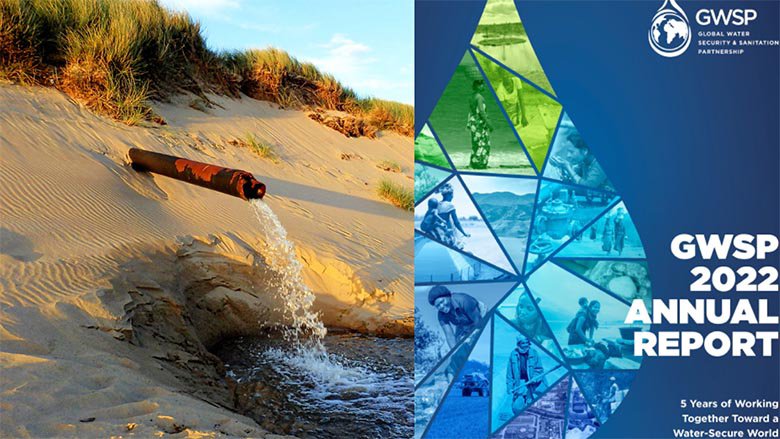Download the 2022 GWSP Annual Report, here.
The Global Water Security and Sanitation Partnership (GWSP) continues to advance global knowledge and build the government capacity needed to support the sustainable delivery of water services. The fiscal year running from July 2021 to June 2022 (FY22) presented both unprecedented and complex challenges. The COVID-19 pandemic progressed from a crisis to an ongoing development issue. Meanwhile, new challenges in the forms of inflation and rising interest rates emerged, contributing to an emerging debt crisis and threatening global stability, further jeopardized by the war in Europe. Underlying these economic concerns, the impacts of climate change continued to grow and deepen. In this context, investing in water and sanitation remains essential for eradicating poverty, addressing the negative impacts of climate change, and building more inclusive and equitable societies.
GWSP’s focus on analytics, timely data and information, and effective capacity development is ever more crucial. GWSP continues to support analytical inputs that influence decision-making in client countries. GWSP has now been in operation for over five years, supporting client governments through the generation of innovative global knowledge and the provision of country-level support.
This year’s Annual Report describes how GWSP’s business lines and initiatives have progressed since GWSP’s inception, and outlines some of the lessons learned.
In this year’s Annual Report, GWSP results and impact are presented through its three business lines: water resource management, water in agriculture, and water supply and sanitation, highlighting GWSP’s five key themes: inclusion, resilience, finance, institutions, and sustainability. The report also provides an in-depth look at issues that GWSP has been particularly active in addressing. This year, the Annual Report’s Special Focus chapter describes how GWSP’s support is contributing to improvements in global biodiversity, climate change, water sector Public Expenditure Reviews, inclusion, and countries affected by fragility, conflict and violence.
SPECIAL FOCUS:
Fragility, conflict, and violence
Work by the Water Global Practice (GP) in FCV-affected countries has grown significantly since GWSP’s inception, and the Partnership now supports active engagement in 33 countries. For instance, over the past five years, GWSP helped transform how the World Bank works in Somalia, developing capacity and political capital. GWSP support to a three-step process – analytics, pilot, scaling up – has meant that an initial investment of $400,000 for analytical work has grown to a portfolio of World Bank grants to the water sector totaling $130 million.
Climate change:
Over the past five years, climate change considerations have become embedded in GWSP support, as reflected in the rising number of projects with climate co-benefits. In FY22, GWSP continued to play an important role in supporting the integration of climate considerations into client countries’ policies and investments, supporting the World Bank’s Climate Change Action Plan. As the role of climate in the water portfolio grows, GWSP funding has helped support climate and disaster risk screening, climate co-benefits assessments, greenhouse gas (GHG) accounting analyses, the use of a carbon shadow price in economic analysis, and integration of climate change indicators into projects’ results frameworks.
Public Expenditure Reviews:
Public Expenditure Reviews (PERs) assess how public funds are spent, how well they are spent, and what the funding and financing gaps are. GWSP supported the development of a robust methodology and comprehensive approach to implementing PERs in the water sector, covering water supply and sanitation, irrigation and water resources management. The water PERs revealed that in many developing countries, policy priorities and public fund allocations do not align. Budget execution rates in the water sector are considerably lower than those of other sectors, and even when funds are properly allocated, only an average of 72 percent are actually spent due to low execution capacity.
Social inclusion:
Since its inception, GWSP has supported social inclusion in water, and an emerging lesson is that achieving real change is possible, but is a slow and often non-linear process, involving the challenging work of changing institutions, shifting social norms, and identifying opportunities to better align incentives to promote inclusion. In FY22 almost half of all countries with World Bank water operations included actions on disability.
Biodiversity:
GWSP is supporting opportunities to further increase the benefits derived from integrating biodiversity into water sector investments. The use of nature-based solutions have significant potential to increase biodiversity while also adding to resilience, making them an effective way to achieve multiple objectives. Over the past five years, GWSP has supported client countries in developing the potential of “green” infrastructure and nature-based solutions alongside traditional “grey” infrastructure investments.
EXECUTIVE SUMMARY of the 2022 GWSP Annual Report, here.
FEATURE STORY: Global Water Security & Sanitation Partnership: Five years of advancing a water-secure world for all
BLOG: Climate Adaptation in Action: the Global Water Security and Sanitation Partnership
